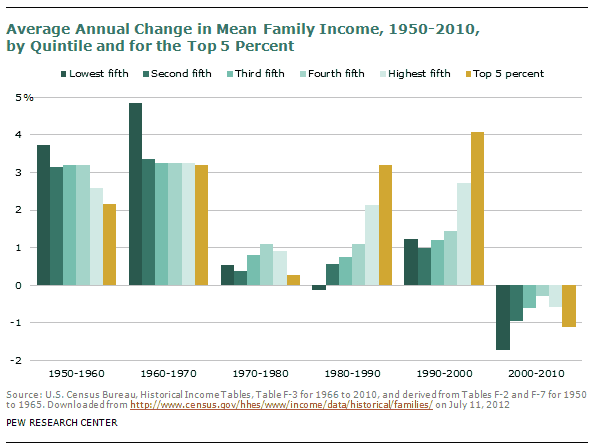From The Lost Decade of the Middle Class:
In the half century following World War II, American families could always count on rising prosperity. Each decade ended with family incomes higher than what they were at the start. That is no longer the case. Years of slow growth punctuated by two recessions left American families with lesser incomes and less wealth in 2010 than in 2000.
This “lost decade” is unique in the modern era. It is the only decade in which real incomes fell for all families combined as well as for families in every economic stratum examined. For all families, the “lost decade” did more than merely fail to deliver gains; it also erased some of the gains from the previous decade.

Based on income growth, the 1950s and the 1960s were the most beneficial decades for American families in post-WWII times. The mean income for families overall increased at an average annual rate of 2.9% from 1950 to 1960. Growth was widespread across the economic spectrum. The mean income of families in the lowest income quintile increased at an annual rate of 3.7%, and the mean income of families in the top 5% increased at an annual rate of 2.2%. Incomes of other families increased at rates in between.
Income growth accelerated in the 1960s, ranging from an annual rate of 4.9% for families in the lowest income quintile to 3.2% for the top 5% of families. Two recessions each in the 1970s and the 1980s slowed the growth in family income but did not bring it to a halt. For all families combined, mean income increased at an annual rate of 0.9% in the 1970s and 1.4% in the 1980s. The one exception to general growth was in the 1980s, with families in the lowest income quintile experiencing a drop in their income at an average annual rate of 0.1%.
The 1990s began with a recession but then delivered the longest economic expansion in modern U.S. economic history. Thus, income growth sped up again for families in all strata to an overall average annual pace of 1.9%. However, the income trends before and after 1980 had one significant difference: Unlike previous decades, income growth in the 1980s and 1990s favored the higher income brackets, and economic inequality in the U.S. rose as a consequence.
Read more from the Pew Research Center’s report
More To Read
March 24, 2025
Remembering former Washington State House Speaker Frank Chopp
Rep. Chopp was Washington state’s longest-serving Speaker of the House
February 11, 2025
The rising cost of health care is unsustainable and out of control
We have solutions that put people over profits
January 29, 2025
Who is left out of the Paid Family and Medical Leave Act?
Strengthening job protections gives all workers time they need to care for themselves and their families

Jim Mueller
I think you are leaving out a very important factor in reviewing this shift in income growth post 1980. The healthier economy allowed for upward mobility of the lower quintiles workers to move from a lower quintile to a higher one. In actuality, many were catapulted up several quintiles during this rapid expansion of the middle class. This skewed the data to appear more disparate than it actually was, as the more productive earners once stuck in the upper ends of the lower quintiles finally earned enough to land in the higher quintiles. The USA’s burgeoning high-tech sector was a major catalyst for these new, high paying jobs that appeared and drove the economy to record growth. This simply was not the case when the US was stuck in the malaise of the Carter era economy, mainly remembered for weak-kneed foreign policy, miserably long waits for gasoline to put in our vehicles, and hostages being held in Iran for almost a full year!
Mar 20 2024 at 11:58 AM